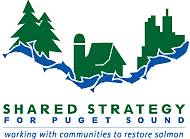|
Family Farm Promotes Salmon Friendly Practices  Andy Wilcox and Barrie Wilcox proudly display All things are connected. It’s an age-old lesson that may take
some holiday grocery shoppers by surprise this season when they go to
purchase an essential ingredient in their eggnog—eggs—and
see a “Salmon-Safe” logo. Qualification for the eco-label required the family-owned farm to meet several environmental standards that seek to provide better water quality and habitat protection for salmon and other wildlife. Wilcox earned its certification by voluntarily putting several sustainable practices to use on their farm. Working with the Nisqually Tribe, they restored native trees and vegetation along portions of Horn Creek and the Nisqually River to shade water and improve habitat for the Chinook, coho, chum, pink and steelhead that spawn or over-winter in the steams that are on or near their property. Wilcox also significantly reduced their use of commercial fertilizers and pesticides on the land; fenced off livestock from the rivers and streams to create large buffer zones; and perhaps the most monumental task of all, established a system to remove from the farm, most of the animal waste produced by over 1 million laying hens and baby chicks. The accomplishment is an important step in helping to maintain water quality. To keep up with the task, the recently renovated chicken houses are
equipped with a conveyer-belt system to remove the manure that would otherwise
pile up. Several truck loads each day haul away tons of manure to the
largest organic farmer in the state. According to Barrie Wilcox, The farm
also composts some of the animal waste on site. Keeping the farm and the chickens healthy also means healthy eggs, says Wilcox. The family adds flax seed to the birds’ feed, making the eggs rich in omega-3 fatty acids. “It’s far better tasting than a spoon full of cod liver oil, and we’re able to provide the benefits of fish oil to our customers by doing this.” Wilcox intends to label its other products, including dairy, as more of the Farms’ land-base is evaluated and certified by the program, but for now their organic and omega-3 eggs are enjoying the limelight of a growing market that caters to consumer demand for food products produced with environmentally sensitive methods. “Our customers are telling us that this is what they want,” says Wilcox. “We’re listening to them, and we’re adapting to make good things happen for them and for the environment.” Making the Connection: Agriculture & Salmon Many of the major salmon-bearing streams in the Puget Sound flow through productive agricultural valleys. Because of this, farmers in the region play a critical role in salmon recovery. Wilcox farm is a leader in recognizing this, says David Burger, executive director of Stewardship Partners. According to Burger, their success in combining environmentally friendly practices with farming serves as a model for other farmers. “As one of the largest family-owned dairy operations in Washington, Wilcox Farm is a leading example of how agriculture and salmon conservation go hand in hand,” says Burger. Enthusiastic about the success of the Salmon-Safe program, Burger says that the eco-label certification is catching on. Stewardship Partners is currently promoting the program throughout the Puget Sound as a means to engage farmers in regional salmon recovery and so far 25 farms throughout the area have been awarded the Salmon-Safe label. Opening up the Farm The Wilcox family wasn’t always as environmentally conscientious as they are now. Since the early 1900s they farmed the land, like many other dairy farmers in the area, without taking proactive steps to ensure healthy water quality and habitat for salmon and other animals living near the streams. In the mid 1980s things began to change on the farm. A group of government and fisheries representatives, called the Nisqually River Council, came together to manage and develop a plan for the Nisqually River basin. Initially skeptical, the Wilcox family joined the group intending to protect their property rights. What happened was the beginning of a long-time friendship between the Wilcox family and Nisqually Tribal elder and noted salmon conservationist Billy Frank, Jr. Gradually, the Wilcox family became one of the proponents of the plan helping to shape actions that affect not only their farm but the entire watershed. Today, fourth generation family member Andy Wilcox, who runs the egg operations, says the farm intends to continue to expand its environmental awareness and education efforts both internally and externally. “We’d like to open up the farm and let visitors see how it runs, and encourage our employees to get involved,” says Andy. To involve the public, the family aims to build a 2-1/2 mile interpretive trail starting from the chicken houses, where the organically raised laying hens and chicks live, to Horn Creek, which runs into the Nisqually River. To complete the work, Wilcox will continue to build on collaborations with the Nisqually Tribe, the Nisqually River Council, and the Nisqually River Foundation. Andy hopes the project sparks interest with some of the Wilcox employees, who he imagines could lend a helping hand by collecting data as part of the Nisqually Tribe’s Salmon Watchers Program. For visitors to the farm the interpretive trial would serve the mutual
benefit of providing an opportunity to learn about salmon habitat and
salmon life cycles while seeing a working farm in action. In addition to the Wilcox Farm’s eggs, Stewardship Partners has certified dozens of other Salmon-Safe products throughout Puget Sound including vegetables, apples, berries, and even wine. During the holiday season, you can see the Salmon-Safe label on Wilcox Farm’s eggs and other agricultural products in PCC Natural Markets, at other local retailers, and at Seattle area farmer's markets. — P. Chambers, Shared Strategy For more information contact: |
||||||||||||||||||||


